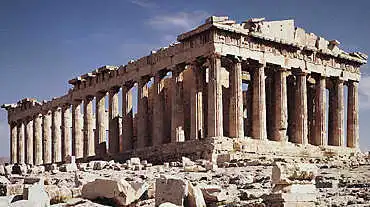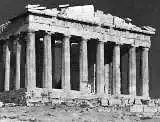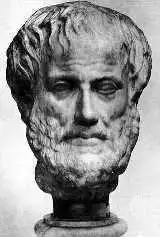Cosmos of the Ancients The Greek Philosophers on Myth and CosmologyEuhemerus lthough Euhemerus (circa 330-260 BC) never made himself a name comparable in grandeur to that of the majority above, he hung on to posterity by his very name, so that theory on myth and religion along his line of thought is called euhemerism.
lthough Euhemerus (circa 330-260 BC) never made himself a name comparable in grandeur to that of the majority above, he hung on to posterity by his very name, so that theory on myth and religion along his line of thought is called euhemerism.
Euhemerus saw myth as a history in disguise, where the gods being worshiped were originally living men, elated in this way because of some great feat of theirs, or their shiny virtue, perhaps sometimes simply because of all the power they had when alive. Men who had been glorified when alive, had by later generations been deified. This theory was adopted and applied by numerous scholars during all of the Christian era, well into our days, more or less closely similar to how its originator had used it. The most elaborate presentation of Euhemerus is in Diodorus of Sicily, The Library of History, from the first century BC, when discussing what different theories the ancients had regarding the gods: Certain of the gods, they say, are eternal and imperishable, such as the sun and the moon and the other stars of the heavens, and the winds as well and whatever else possesses a nature similar to theirs; for of each of these the genesis and duration are from everlasting to everlasting. But the other gods, we are told, were terrestrial beings who attained to immortal honor and fame because of their benefactions to mankind, such as Heracles, Dionysus, Aristaeus, and the others who were like them. Regarding these terrestrial gods many and varying accounts have been handed down by the writers of history and of mythology; of the historians, Euhemerus, who composed the Sacred History, has written a special treatise about them, while, of the writers of myths, Homer and Hesiod and Orpheus and the others of their kind have invented rather monstrous stories about the gods. Diodorus goes on to present Euhemerus as a friend of king Cassander, first ruler of Macedonia after the death of Alexander, himself to remain on the throne no more than four years until his death. It was Cassander, though, who sent Euhemerus to sea on international errands, going southward from Arabia for a number of days, before carried to shore on the island of Panchaea. On this island he saw pious inhabitants worship their gods with magnificent sacrifices, and he found a temple to Zeus, in which there was a writing telling the deeds of Uranus, Cronus and Zeus — when they were men who walked the earth. Euhemerus goes on to say that Uranus was the first to be king, that he was an honorable man and beneficent, who was versed in the movement of the stars, and that he was also the first to honor the gods of the heavens with sacrifices, whence he was called Uranus, or "Heaven". There were born to him by his wife Hestia two sons, Titan and Cronus, and two daughters, Rhea and Demeter. Cronus became king after Uranus, and marrying Rhea he begat Zeus and Hera and Poseidon. And Zeus, on succeeding to the kingship, married Hera and Demeter and Themis, and by them he had children, the Curetes by the first named, Persephone by the second, and Athena by the third. And going to Babylon he was entertained by Belus, and after that he went to the island of Panchaea, which lies in the ocean, and here he set up an altar to Uranus, the founder of his family. Thus, the whole Olympian community began as a family matter. Euhemerus further tells of Zeus conquering Cilicia and visiting many other nations, "all of which paid honor to him and publicly proclaimed him a god." It is generally assumed that the island of Panchea, as well as the rest of what Euhemerus accounts, is more or less fiction of his. Yet, this approach to mythology, seeing behind it some distant historical facts did not therefore lose their credibility. Myths, also those involving the gods, even the very genesis of them as well as the whole world, tend to be mingled also with the affairs of men. In this, Homer is certainly a good example, having gods and men interact to the extent that they become difficult to tell apart at all. To the Christian thinkers, the ideas of Euhemerus had that advantage, too, of doing away with the heathen ingredient in the Greek myths, without having to do away with the myths altogether. The stories of old could be nourished and retold, with an interpretation doing pretty much the reverse of what Euhemerus said once had taken place, so that men having been turned into gods could be turned back into men.
LiteratureDiodorus of Sicily, The Library of History, book VI, translated by C. H. Oldfather, volume 3, Cambridge 1970.
© Stefan Stenudd 2000

The Greek Philosophers
AristotleIntroductionAristotle's LifeTimelineAristotle's PoeticsAristotle's CosmologyAbout CookiesMy Other WebsitesCREATION MYTHSMyths in general and myths of creation in particular.
TAOISMThe wisdom of Taoism and the Tao Te Ching, its ancient source.
LIFE ENERGYAn encyclopedia of life energy concepts around the world.
QI ENERGY EXERCISESQi (also spelled chi or ki) explained, with exercises to increase it.
I CHINGThe ancient Chinese system of divination and free online reading.
TAROTTarot card meanings in divination and a free online spread.
ASTROLOGYThe complete horoscope chart and how to read it.
MY AMAZON PAGE
MY YOUTUBE AIKIDO
MY YOUTUBE ART
MY FACEBOOK
MY INSTAGRAM
MY TWITTER
STENUDD PÅ SVENSKA
|
 Cosmos of the Ancients
Cosmos of the Ancients